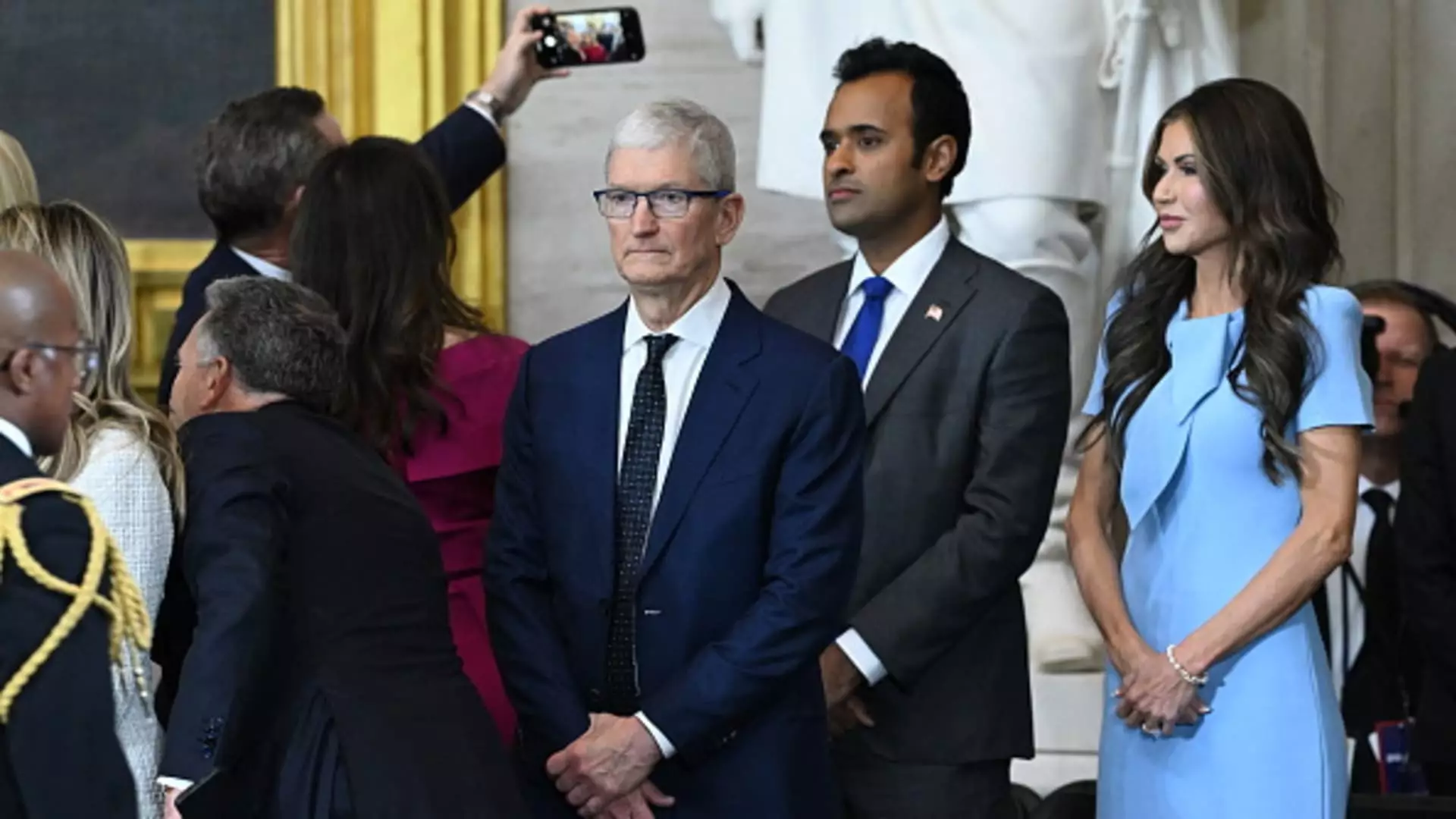When Apple, the tech behemoth led by CEO Tim Cook, delivered its quarterly earnings last Thursday, investors were left in a state of tension, grappling with a financial forecast that was as worrisome as it was curious. Despite the company posting revenue beyond Wall Street’s expectations and showcasing notable growth in their iPad and Mac segments, shares plummeted by nearly 4% in after-hours trading. This dissonance illustrates a broader narrative: even the most formidable companies are not immune to the chaotic political environment shaped largely by President Trump’s unpredictable tariff policies.
In a landscape where tariffs are more than just economic policy—they’re the new geopolitics—Apple’s growth story is intricately tied to a series of adversities that stem beyond mere number crunching. Cook revealed that in the first quarter, the impact of tariffs was limited, yet an ominous shadow looms over the next quarter, with projections estimating an additional $900 million burden. This revelation surprised analysts who were bracing for a higher figure, thus signaling a disconcerting ambiguity that investors have come to dread.
Tariff Tango: Sourcing Strategies at Play
Apple’s strategic shifts to mitigate tariffs are fascinating yet troubling. Cook highlighted efforts to source products from India and Vietnam—countries that are currently subject to lower tariffs. However, the situation remains precarious as these nations find themselves in the crosshairs of potential U.S. tariffs starting in July. This juxtaposition of strategic sourcing against a backdrop of uncertain tariffs exemplifies the fragile nature of corporate stability in a highly politicized environment.
Moreover, Cook’s admission that Apple had built up inventory to shield against impending tariffs speaks volumes about the company’s limited foresight. The practices of stockpiling and realigning supply chains may offer temporary relief, but they reflect a knee-jerk reaction rather than a well-thought-out stratagem. Cook’s reluctance to provide guidance beyond the immediate quarter only deepens the investor anxiety, a sentiment that is echoed across the technology sector.
The Ripple Effect on Big Tech
Apple’s experience isn’t an isolated case; numerous tech giants face similar pressures from the administration’s tariff strategies. Amazon’s CFO Brian Olsavsky hinted at the possibility of weakening consumer demand due to tariff-related uncertainties, demonstrating that the ramifications of such policies cast a long shadow across the industry. Microsoft, in a rare move, increased prices for Xbox consoles in light of tariffs, underscoring the far-reaching effects of this political volatility.
Apple’s Services division, one of its fastest-growing segments, was notably absent from the guidance Cook offered, leaving stakeholders to question if the tariff situation is impairing their broader strategy. The projected annual revenue growth of “low to mid-single digits” stands in stark contrast to the once unassailable narrative of Apple as a leader in innovation and growth.
Cook’s Balancing Act: Operations and Optimism
While Tim Cook is known for his operational prowess, his optimistic rhetoric seems increasingly misplaced against the realities of the current administration’s policies. He praised his team’s efforts in optimizing supply chains and inventory management, yet these dodges around tariff implications are insufficient. The uncertainties stemming from potential changes to tariff structures and newly proposed tariffs on semiconductors only add layers of complexity to an environment that demands agility and foresight.
Cook’s ambiguous statements regarding the future indicate that even the most adept operational leaders are at the mercy of political capriciousness. Regardless of how adept the internal mechanisms are at minimizing immediate damages, the overall health of Apple’s brand and business model hangs in a precarious balance, resting on a political landscape that is perpetually shifting.
A Cautionary Tale for Investors
In essence, what we see playing out with Apple serves as a cautionary tale for investors and corporations alike. The complexities of tariffs can dramatically reshape operational strategies and financial forecasts, invoking a crucial examination of risk factors in investment portfolios. As geopolitical tensions rise and policies pivot, the recession of predictability is a harsh reminder that even the industry’s most revered players are not exempt from the disruptions wrought by governmental unpredictability.
Apple’s experience acts as a microcosm of a larger truth in today’s global economy: political actions have tangible, often adverse impacts on corporate performance and market stability. The stakes are high, and investors must adopt a keen eye for both opportunities and potential pitfalls in an environment defined by volatility.

